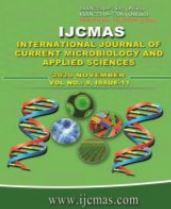


 National Academy of Agricultural Sciences (NAAS)
National Academy of Agricultural Sciences (NAAS)

|
PRINT ISSN : 2319-7692
Online ISSN : 2319-7706 Issues : 12 per year Publisher : Excellent Publishers Email : editorijcmas@gmail.com / submit@ijcmas.com Editor-in-chief: Dr.M.Prakash Index Copernicus ICV 2018: 95.39 NAAS RATING 2020: 5.38 |
A Mother is the prime provider of the primary care to her children during the early years and this care was mostly influenced by her knowledge and understanding of basic nutrition and child health. It was apparent that her education plays an important role in her upbringing of child. The educated mothers tend to avoid having their first child at undesirable early age which slow down risk of Infant Mortality Rate. Literate mothers play assertively a greater part in intra family a decision affecting the child’s needs and also provide early and effective use of health services to their children. Thus, mother’s education and child development were highly associated. This induces better food habits by eating quality food which was nutritious and conductive a good health. The healthy dietary pattern established in childhood keeps various diseases away and this habit builds up throughout till adolescence and adulthood. Thus healthy childhood promises healthy adulthood. Literate mothers play important role for child development and wellbeing. The finding of the study showed that knowledge of mother regarding vitamins (63.33%), minerals knowledge (75%), importance of mother milk (78.33%) and (65%) mothers knowledge about nutritional deficiency diseases and (78.34%) have medium knowledge regarding general health. socio-economic variables had effect on the nutritional knowledge of mother, only education and occupation are highly significant at 1per cent level of significance. 35 per cent cases of malnutrition among children with the maximum per cent (23.33%) under Grade 1 malnutrition, followed by 10 per cent in Grade 2 malnutrition and 1.67 per cent in Grade 3 malnutrition percentage of children under Grade 1 malnutrition was more (23.33%) in male subject as compared to female subject (20.0 %). correlation relation of nutritional status of children with nutrition knowledge of mother (r =0.316*) was positive and significant at 5 per cent with education level of mother was (0.266*) positively.
 |
 |
 |
 |
 |